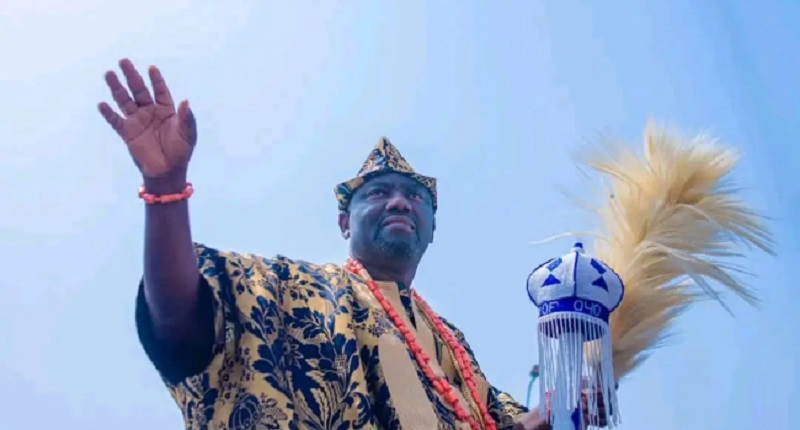
The Director of Media and Publicity to the Alaafin, Bode Durojaiye, has said his principal needs not engage in any form of supremacy battle with any king, either in Yorubaland or anywhere in the universe.
Tracing historical instances which established the Alaafin as the supreme among other traditional rulers, Durojaiye said even the British colonial government in their tradition recognised lineage as meaningful supremacy and legitimacy, preferring to sign the Treaty of Cessation with the Alaafin as the Superior Head of the Yoruba Nation.
In a statement issued yesterday, he said the Alaafin as a veritable custodian of Yoruba culture and tradition had always taken into consideration the safety and welfare of his subjects and would never compromise tradition, culture and development of his people for a pot of porridge.
He said: “These immortal words of Alexander Graham Bell – ‘The most successful men in the end are those whose success is the result of steady accretion. It is the man who carefully advances step by step, with his mind becoming wider and wider – and progressively better able to grasp any theme or situation -persevering in what he knows to be practical and concentrating his thought upon it, who is bound to succeed in thegreatest degree’, sum up the life voyage of Alaafin Abimbola Akeem Owoade 1, an indomitable monarch with an unequalled passion for the great good of all.
“He is a veritable custodian of Yoruba culture and tradition, and has always taken into consideration the safety and welfare of his subjects and will never compromise tradition, culture and development of his people for a pot of porridge.
“The history has been so kind and friendly to Alaafin Owoade publicly since he ascended the throne of his forefathers, as he does not need to get into any battle for supremacy with any monarch, either in Yorubaland or anywhere in the universe.
“Oba Owoade combines humility with royalty to meet the modern day demands. Kabiyesi (the king who no one questions). Iku Baba Yeye (The one who commands death/He who is parent to death). Alashe (He who wields Authority). Ekeji Orisha (Second-in-command to the gods).
“The Alaafin was inducted into the mysteries of various gods like Ifa, Sango, etc, to be the direct representative of these deities on earth. At the hallowed ground of Yoruba ancient shrine, as Oba Owoade made a covenant with illustrious Yoruba ancestors that he would defend, protect and add glamour to the Yoruba norms and tradition.
“Oduduwa’s Principal Minister and grandson, Oranmiyan, (Because Oduduwa begot Okanbi, (an only child and Okanbi begot Oranmiyan among others, namely Ila-Orangun, Oni-Sabe, Olu-Popo, Ala-Ketu, Oba-Benin), founded the city of Oyo when prolonged drought struck Ile-Ife as a result of people’s emigration.
“Oyo simply rose to prominence through wealth gained from trade and its military skills. It was the largest West Africa empire, the most important and authoritative of all the early Yoruba principalities.
“More so, the British as it was in their tradition recognised lineage as meaningful supremacy and legitimacy, preferring to sign the Treaty of Cessation with the Alaafin as the Superior Head of the Yoruba Nation.
“Alaafin relies heavily on the will and wishes of his subjects. In politics also, he is concerned about the sanctity of his position, and whatever happens on the welfare of his people.
“Customs and all traditional practices of today in government, religion and economic life have had distance, and possibly age-long origins, which were based on valid and accepted tenets that emerged from the synthesis and aggregated experience of a particular society.
“One of such societies is the ancient city of Oyo, reputed for cultural resources that are of rich non-material and material attributes and transmitted through generations. Among them are festivals, diet, building of historical and architectural interest and an ancient city walls that have been declared monuments by the National Commission for Museums and Monuments.
“Others are ethnographic assets, which include war dresses, traditional and royal crafts, leather works, calabash decorations, pottery, wood carving and production of traditional drums (dundun and sekere).
“Moreover, the precepts and concepts of Alaafin’s administration have continued to support and nurture the people’s ancient culture, and sophisticated civilisation from time immemorial.
he basic concept of government was monarchy with a rigid adherence to monolithic Oduduwa dynasty and of the paternal line.
“The Alaafin, Iku Baba Yeye (Death, the almighty, ruler and companion of the goods) is the title of the monarch. Even with the divine attributes, the Alaafin operates a government that is judged by its result.
“The prosperity, security and the well-being of the people dictated his popularity both in the palace and in the empire at large.”



